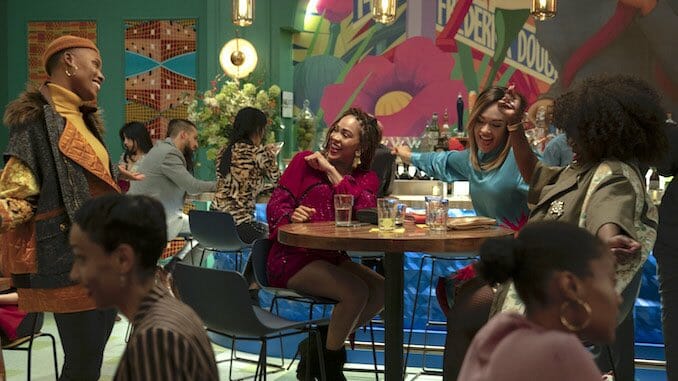Amazon’s Likable Harlem Doesn’t Quite Scratch the Insecure Itch
Photo Courtesy of Amazon Prime Video
At the end of December, HBO’s hit comedy series Insecure—about young Black people in Los Angeles—will come to an end after five seasons, and its finale leaves a gaping hole for elite personable and relatable storytelling aimed at African American audiences. Enter Harlem, a new show on Amazon Prime Video that, whether intentionally or not, aims to fill that void.
Unfortunately, Harlem isn’t the spiritual successor that it perhaps hopes to be. Similar in structure and from a writing team that has worked on First Wives Club and the hit film Girls Trip, the show follows four women in Harlem as they deal with the rollercoaster of drama of their own personal and professional lives. Camille (Meaghan Good), the show’s central character, is an anthropology professor at Columbia who is desperate for both tenure and a way to get over her ex who is unexpectedly back in town. Tye (Jerrie Johnson) is a queer tech start-up founder whose product is about to make it big, while Quinn (Grace Byers) and Angie (Shoniqua Shandai) are a pair of roommates who have different views on everything from money to men.
There are shades of the Issa Rae-led comedy throughout, and it’s hard not to compare the two shows in premise and execution. If Camille is Harlem’s Issa, she lacks a lot of the personality that was infused in Issa’s one-liners and mirror alter-ego. The show itself is introduced with an aside about Mosuo women (a tribe that Camille has studied) and though thematically the Mosuo women’s independence and status in society is relevant to the series, the tone feels disconnected from what the rest of the episodes are trying to accomplish, and sets an odd tempo from the start.
Quinn, Harlem’s version of Molly, is wealthy and professionally successful (though not as independently as Molly), and perpetually single. Most of her storylines revolve around terrible dates, but Quinn and Molly’s approach to dating couldn’t be more different: where Molly was a skeptic, Quinn dates with hope, even when she shouldn’t. In the first three episodes provided for review (out of a total ten), Quinn’s bad luck with Tinder dates provide a source of comedy, but the laughs are minimal and fleeting.
To that end, Harlem has very few male characters, and the ones it does have aren’t developed. As a show about women and female friendship, this makes sense on a surface level. But a little character development for Camille’s ex or any other past relationships that pop back up would go a long way in ensuring that audiences are getting a rounded story, and are actually invested in how it plays out.
-

-

-

-

-

-

-

-

-

-

-

-

-

-

-

-

-

-

-

-

-

-

-

-

-

-

-

-

-

-

-

-

-

-

-

-

-

-

-

-








































